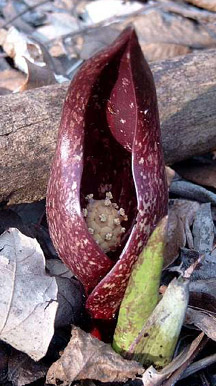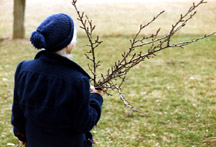Poem written by Jennifer’s mother.
Photograph of Jennifer’s grandmother.
January, February, March, April
Christmas was one of the times to be born:
Christmas or January, the Christmas mothers
having quickened to the call of spring
more urgently, put out their shoots
like indoors plants in the pull of the early sun,
before the warmth of air and sky
and earth and water could tempt the rest.
Yet she was not a Christmas baby,
but an April, conceived in summer
when all the world was hot and vibrant,
not gone to seed. She was moreover
an inflation baby, thought of
before depression, born after.
No, they had not wanted her,
they said so, later, frankly.
“But you were such a cheerful baby,
you smiled, and we were glad you came.â€
And yet she knew, she had her birthday mates,
born the self-same day: parents divorced,
baby squalling in the background.
The grandmother brought them up, the aunt.
Not hers, no, with her mother too Puritan
to quit the father, penniless, despondent.
Hers stuck, said nothing but,
“We didn’t want you, no, but you
were such a happy baby, you smiled,
we had to laugh.â€
Yes, it was one of the times of year
to be born, April, conceived in summer,
carried triumphant through the blazing fall,
holding heavy through the long
New England winter, holding, heavy, despondent.
(And will we all get through it this year?
she couldn’t help but wonder. No,
for Grampa died on Friday.) And then,
in April, the hepaticas curling silvery
and the skunk cabbages curving purple,
then to come: sturdy, smooth,
small, dark and determined. Then
to come, yes, to be born.
Yes, it was one of the times of year to be born,
April, the world waiting expectant,
ready to laugh and smile through the wet,
and she grew like an April child, shy,
expectant, into summer. “What,â€
she said, “will the world do, now
I am come? Will it perhaps change?
They will war no more when they see me.
People will work and war no more.
There will be no orange peels thrown in the street.â€
So she went forth to seek her fortune,
and was strong, willing, worked hard and was tired.
She stooped to pick up orange peels
a thousand times a day, candy wrappers, pop bottles.
But they threw them, and at her, and she said,
“Good heavens, whatever is the matter?â€
and they said, “Shit. Aw, shit.â€
“You know,†said her friend one May morning, “it seems
really quite senseless to me, yes,
it is very lovely to sit here under
the apple blossoms eating liverwurst
sandwiches on pumpernickel bread,
and carefully saving the waxed paper to stow
in the receptacle at the end of the park,
but it really does seem quite senseless to me:
when you look underneath, there is absolutely nothing
holding it all up. It is like Euclid,
lovely and simple and complicated, but
there is nothing behind those geometry
theorems at all.â€
“Oh, that is true,†answered the girl helplessly,
“but the apple blossoms are lovely,
are they not?†Yet her heart sank
within her, for her friend, too,
was an April baby, born that self-same
day of affirmation just past,
but her friend asked so very much.
“I,†her friend said, “am not sure
that I shall bother to look again,â€
and the girl knew the bottomless panic
for the first time. When her friend
died, and by her own hand, the girl
was furious. God was stupid, exceedingly stupid;
there had been a terrible mistake.
So she wrote to a boy she knew, also April.
“Come,†she said, for she knew no other
word, “is the world not beautiful,
will they not war no more when they see us?
Come, we are grown, it is May already,
time that we and our lives bore fruit.
Come, we will work and be tired, come.â€
And so there was marriage, January children,
all but the first. Tired. They were tired.
Christmas came, January and winter
set in. “Here,†she said, “it is only
February, I am exhausted, they
are driving me wild, here it is only
twenty to three, supper at five,
bed at seven, and already they
have crayoned the walls, clayed the floor,
spilled milk twice and left six leaky
orange juice cans in a pool on the couch.
Only nineteen minutes of three
and the fifth of February.â€
“Come,†she said to them, snowsuits, mittens,
boots, hats, “out, under the sky,
along the Charles, under the sycamores,
there will be a sign.†And the sign came:
black birds came alight on
the forsythia branches, shaking the snow.
She gathered the large sprays and hurried them home.
“These will be forced,†she said,
“before you know it, it will be March,
the room will be ablaze with yellow,
it will be lovely. We will see
the philodendron sprout and
the kalanchoe bloom. The long
winter weeks of brooding will be over.
Spring will come for us, yes,
rebirth, yes, the affirmation.
Why could she not have waited? ëMy friend,
we are all, else, here. We all are,
though Grampa did die on Friday.’â€
It was, it was a good time to be born, April.
More babies were born into the world,
sons of April sons, daughters
of April daughters, those that were left
after war, suicide, divorce and darkness.
More babies wriggled in wrenching agony
toward the world, strong and moist
as hyacinth buds freshly surfacing,
tensed for the last huge pushing pop.
“Yes, pop, they do pop, corks from bottles,
except slightly more dignified. Yes,
sweetheart, you did, too. I was
tired, but I was glad you came.â€
More babies were born into the world,
January, February, March and April,
some on her birthday: a boy, Christopher,
a girl, Sarah (the names that year).
Six pounds, twelve ounces, eight
pounds, four. Did the parents know
that Christopher was “Christ-bringer,â€
Sarah, the middle name
for Hitler’s Jews? What
did they know, except for club feet,
which didn’t happen any more,
though flippers did. What could
they know, except for constipation?
Over and over she bore them
or bore them with her, through
January, February, March
and April. They’d make it
to April, many an April. Such
a fine time of year to be born.
Except then it struck her:
May was the problem.
Nancy Tomlinson Hall Rice 1930 – 1988
(This poem was written sometime between 1962 and 1973.)

“Sturdy, smooth, dark and determined.”


Longest setup to a one-liner I’ve ever heard.
Adam, perhaps it would make more sense if you knew that spring contains certain Mummy-rituals for me, made more urgent this year by my father’s 3/4 century mark (today), my search for my mother’s (unpublished) novel, and my discovery of her senior paper, written about an overlapping time period. So Michael did a wonderful job filling my request, and even found a skunk cabbage, and the time to photograph it, to go with.
I had lent Michael my photos a while ago, and yesterday I requested that he put the photo of my grandmother holding the branches for forcing with the poem. What’s funny is I thought she was holding blooming forsythia, which of course doesn’t all add up. She wouldn’t have brought forced forsythia back outside, and it wouldn’t have been blooming outdoors yet in early April, which is when we were gathered for my mother’s birthday.
Thanks Michael.
Jennifer — by no means take “longest” to be a euphemism followed by an invisible but understood “unnecessarily”. I loved the poem, its rhythm, its revisiting of phrase and cadence. Classical, even professional, and obviously heartfelt. I just tried to be inversely concise in my “review” for the sake of sheer cheekiness, as is my wont. Thanks for taking the time out to share your world.
Oh. OK. It’s very hard for me to figure out if I find her writing interesting only because I lived through part of it.
Jennifer, not being a poem person, I don’t usually read poems that long all the way through, but the meter and the flow just carried me on. Thanks for posting it.
And Mike, I’ve never seen a skunk cabbage at that stage of its growth. Amazing plant. How big was it?
Jennifer, I’m glad you shared this. Like Rakkity I am not a poetry person, but I enjoyed this and only had to read it twice to “get” it. Thanks for sharing. And Adam I appreciated your quip as well.
Where do I start?
I agree with Rakkity, the poem carries you along, and as it does so, it tells a powerful tale. The follow up (due out any day now) comes from the paper she wrote, which to me has a Harper Lee feel. Her phrasing adds interest to the content. Speaking of which, and this is a ridiculous segue, I brought Namesake with me while I was having my root canal today. About halfway through the procedure I began to panic as this thought flashed in front of my open eyes This is the most god awful writing IÃve ever read and I believe sitting back and experiencing these wires shoved up the canals of my tooth is going to be less painful than continuing to read this pedantic, obsessive drivel. I continued anyway, and believe me, it was a tossup. Okay, back to the here and now.
IÃm glad Jennifer wheedled a more detailed answer out of Adam, otherwise I was thinking it was woodshed time.
I find it intriguing that J pictured blooming forsythia. I mean, why not? That is a stark, much-better-without-the-blooms photo to accompany that poem, but I know I would have remembered it with yellow flowers.
Rakkity, if you hadnÃt asked that question, I would have been content to let Jennifer imagine me running around and finding a skunk cabbage to photograph. The one pictured was heisted from the web.
Michael, I’m shocked. Well, I can at least tell you about how big it was: about 6 inches, with the “flower” about an inch across. If he had found one himself, he would have been so taken with the glossy/sleek purple outside and the accompanying floppy chartreuse leaves with white veins (not present in this specimen) that he probably wouldn’t have bothered to discover the alien thing in the middle.
What’s Namesake?
Sorry, tomorrow’s tale will not be the aforementioned follow-up.
One more thing. Chris, was there something specific to “get”? I mean, I always thought of the final line as just a way to get you out of the poem, somehow, it has to end with a bang or it’ll just keep going. I’ve liked it because I can hear her speaking it at a poetry reading on the Amherst Common when I was about 12, and I liked imagining her writing to my father and I knew about the friend who had committed suicide (we had Eva’s philodendron when I was growing up, and I think I still do). But help me out here, is there something else to get?
There is nothing else to get. I didn’t “get” the ending. Poetry mostly taxes me and now you see why.
Michael, for heisting that skunk cabbage photo without attribution, your blog photomeister badge has hereby been revoked. Cut it in half and run it through the blender this instant and sprinkle it on your morning wheaties.
And there I was picturing Michael trudging through the mud and ice pools, leaning this way and that, pointing his e-camera to get the best angle on that mysterious flower.
But now, you’ll forgive me for heisting a few good
photos of Spanish hotspots in http://ed.schmahl.org/Iberia/Chapter_III/chapter_III.html
(I hope to heck I’ve put attributions in all the 3 or 4 “heists”. I hate badge-sprinkles on wheaties.)
Jennifer, I don’t know you (or anyone on the blog except Mike and Diane), but I have to tell you I loved the poem – and I read lots of poetry.
Thank you for sharing.